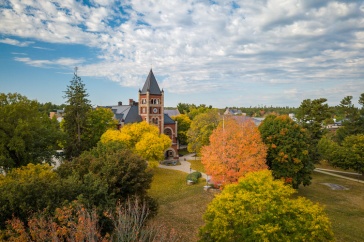
Long-time NH Agricultural Experiment Station researcher William McDowell has been named UNH's 2017 Distinguished Professor, an award that aims to "identify and honor longstanding members of the faculty. This singular universitywide award will be given each year to the faculty member whose overall record of excellent teaching, caring about students, devotion to the university community, and substantial record of scholarly achievement exemplifies what we would call a ‘distinguished career.’”
A professor of natural resources and the environment in the College of Life Sciences and Agriculture, McDowell has been at UNH since 1989 and has received experiment station support since 1990. Learn more about his research and how the experiment station has supported him in the Q&A below.
What is your area of research inquiry?
My primary research area is understanding the connections between land and water, specifically how watersheds and watershed processes affect stream chemistry. My lab group does a lot of chemical analyses of rain water, groundwater, and surface water to understand spatial patterns in stream chemistry across a landscape, and to document long-term changes in water quality at key locations. Our fundamental goal is to understand the role of trees, soils, rocks, aquatic biota, and people in shaping water quality.
What drew you to this area of research? Why are you passionate about it?
I have always been drawn to the water, ever since I was a small child. I grew up with fish, frogs, and turtles as pets, and spent much of my spare time down at the stream in the woods behind our house. As an undergraduate, I took a course in aquatic ecosystems, and got hooked on taking a quantitative approach to understanding how streams and rivers function. I have been doing it ever since.
How does your research make a difference in New Hampshire and New England?
Water quality has improved a lot in the region over the last 80 years, but considerable challenges remain. One of the biggest is to manage the nutrients in streams and rivers that drain into our bays and estuaries. By documenting the importance of various nutrient sources and biogeochemical pathways in regulating water quality, the data and insights produced by my lab group have helped in understanding how to reduce nitrogen impairment in Great Bay and other estuaries in New England. We take a comprehensive approach that includes analysis of all the different forms of nitrogen, not just the total concentration of all forms lumped together. This makes our data particularly helpful in tracking where nutrients are coming from, and thus how remediation efforts can be targeted to provide the most efficient ways to improve water quality.
How important has NHAES funding been to supporting your research?
The support of NHAES has been critical to my success as a researcher. AES facilities provide some of my research sites, and the AES has purchased some of the equipment I need to maintain a cutting-edge laboratory for water quality analyses. The funding that is available to support NHAES research projects has also been instrumental, because it allows me to develop a long-term research program that provides some of the key data I need to develop nationally competitive research proposals.
-
Written By:
Lori Tyler Gula, PhD | NH Agricultural Experiment Station | lori.gula@unh.edu | 603-862-1452

















































